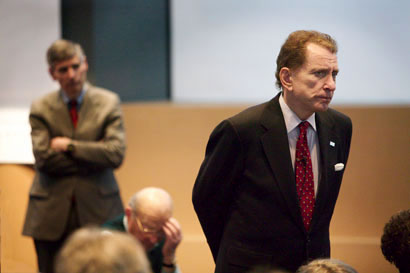Sen.
Specter blasts government stand on stem cells
Clark Center talk focuses on flawed science
policy
By AMY ADAMS
Before a near-capacity crowd in the Clark
Center auditorium Thursday, Sen. Arlen Specter, R-Pa., described
his vision for the future of science funding in the United States,
which includes more money for research, funding targeted for new
disease treatments and the advancement of stem cell research.
As chair of the Labor, Health and Human Services appropriations
subcommittee, Specter’s vision profoundly affects how the
National Institutes of Health, or NIH, funds basic science, such as
research taking place at the School of Medicine.
Specter helped more than double the NIH budget from $12 billion in
1999 to $28 billion in 2004. “This has been heralded as a
mighty accomplishment, but I don’t even think it’s a
start when you are talking about human health,” he said.
This increased funding will go toward finding new treatments for
human disease such as cancer, Parkinson’s and
Alzheimer’s.
Specter also would like the money to be spent on research using
embryonic stem cells. He has been a prominent advocate of stem cell
research in the Congress, calling attempts to ban such research
“scandalous.”

In a visit
to the School of Medicine last week, Sen. Arlen Specter
didn’t mince words when criticizing the Bush
administration’s position on limiting stem cell research.
Shown here listening to a question from the audience, the
Republican from Pennsylvania raised an alarm about U.S. medical
researchers leaving the country to do their work.
Photo: Visual Arts Services
Stem cells have the ability to become any cell type. Researchers
who study stem cells hope they may one day be used to replace cells
lost in Parkinson’s disease, Alzheimer’s disease or in
people with spinal cord injuries, among other disorders.
“We’ve already seen prominent researchers leave the
United States for places where they can pursue stem cell
research,” Specter said.
Roger Pedersen left UC-San Francisco for the University of
Cambridge in 2001 after President Bush announced limiting
government-funded research to existing stem cell lines. These lines
are considered insufficient because they have been exposed to mouse
cells and may contain mouse virus. Scientists worry these viruses
may be transmitted to humans if the cells are used therapeutically,
Specter said.
Since the 2001 announcement, Specter has held 16 Senate hearings on
the potential of stem cell research. He said stem cell-based
treatments are commonly referred to as “therapeutic
cloning,” a term he said gives people an inaccurate idea
about the technique. He argued for the scientific community to use
the term “nuclear transfer” as a better way of
describing the creation of new stem cell lines while avoiding the
controversial word “cloning.”
Despite his efforts, stem cell legislation is in what Specter
called “a state of suspended animation” in the
Congress. “It’s a rough-and-tumble debate,” he
said. Opponents argue that allowing the creation of new stem cell
lines could open the door to reproductive cloning, in which a new
person is created from an adult cell. To prevent this outcome, a
group of senators led by Sen. Sam Brownback, R-Kan., have proposed
criminalizing the creation or use of new stem cell lines with a
$10-million fine and 10 years in jail.
“We’re facing the same problem Galileo faced,”
Specter said. “Can you imagine? They want to send scientists
to jail.”
During a question-and-answer session, Paul Berg, PhD, the Robert W.
and Vivian K. Cahill Professor of Cancer Research, emeritus,
suggested moving forward with a ban on reproductive cloning as one
way of easing those concerns and allowing the creation of new stem
cells. “If we had a law banning reproductive cloning as
exists in other countries you negate the slippery slope
argument,” he said.
Specter pointed out that opponents of stem cell research avoid
banning reproductive cloning because doing so would eliminate the
most compelling argument against stem cell research. “The
science is being held hostage by those who want to ban nuclear
transfer,” he said. “They are playing hardball
politics.”
Specter urged Stanford scientists to become politically involved in
this debate. He said the only way to overcome opposition to nuclear
transfer is to contact representatives and be vocal about benefits
of the research. Lawyers and doctors have become politically active
to protect their fields – now he says research scientists
must do the same or see scientific research be trumped by
ideology.

|

